“Finding Myself”: Members of the LGBTQ+ Community Share Their Experiences at La Salle
The Falconer spoke with six LGBTQ-identifying individuals. Here are their stories and perspectives.
According to the Williams Institute, Oregon has the second highest LGBTQ+ population per capita in the U.S., just behind the District of Columbia.
December 16, 2020
For students at La Salle, COVID-19 has brought various changes and challenges, whether it be coping with the difficulties of digital learning, spending more time with family, or isolation from friends and peers.
For sophomore Sid L., the pandemic, in part, brought time to reflect.
Sid said that they did “a lot of research” and “a lot of soul searching” in the beginning months of the pandemic, and came to realize that they are nonbinary, which means that they do not fit into the societal gender binary of male or female.
“In every survey you take, and when you meet people, there’s always a box to put yourself in,” Sid said. “And being nonbinary is kind of like, well, I don’t really feel like I fit into either of those two boy-or-girl boxes.”
Sid said this realization was “eye opening.”
“I realized why I had felt out of place a lot,” Sid said. “When people would just exclusively refer to me as a girl, it just felt weird. Like, I got a little shiver sometimes.”
Sid made an analogy for what it feels like to be presented with and expected to fit into one of two boxes — male or female — and not identify with either choice.
“It’s kind of like if someone asked you to define yourself, and they gave you two options and neither one really fit,” they said. “Say you’re someone who’s really into music, and someone asked you, ‘Hey, are you a sports kind of person, or do you really like baking?’ And then you’re like, ‘Neither, I’m a musician.’”
“It’s like there’s no option for you,” Sid said.
In middle school, before their exploration of gender identity began, Sid was bullied for their sexuality, which they said they have “questioned a lot” in the past.
“I think the default when everyone’s growing up is just to kind of assume you’re straight,” Sid said. “It’s been really hard to figure out what I really want and how I identify… I changed it so many times, because I was like, ‘Is just this what I’ve been taught to think, or is this really who I am?’”
Sid said that during their time at La Salle, and as they have opened up about being nonbinary, they have generally had a positive experience with feeling accepted and supported.
In terms of family, “they were mostly accepting,” Sid said, aside from “some people in my family who… just kind of dismissed it, and that was really hard.”
Despite this difficulty, Sid expressed gratitude for their friends, who have taken to the pronouns that Sid uses, which include all pronouns — he/him, she/her, and they/them.
“There wasn’t much of a change, because I use all pronouns, but they really made an effort to switch it up,” Sid said. “I’m really thankful for the friends I have that did accept me. I think it’s really important for anyone — anyone in general — to become friends with people who will be accepting no matter how you identify.”
One place that Sid and others have found community and affinity at La Salle is the Equality Alliance Club, which is a space for LGBTQ+ individuals and allies to meet to talk about identity-related issues or life in general, providing a safe group for club members to rely on.
“A lot of times, it’s hard knowing who else is LGBTQ+ at the school, because there’s really no way of knowing unless you ask someone or they tell you,” Sid said. “So being in the club is a really nice way to just see who else is kind of in your corner, who else understands what you’re also going through.”
Junior Hannah R. is a student moderator of the club, which began during the 2016-17 school year.
“The Equality Alliance is a really special club,” Hannah said. “It’s a very welcoming community… It helped me a lot in finding myself, and I hope that I can help students coming into the school find themselves by being a leader in this club.”
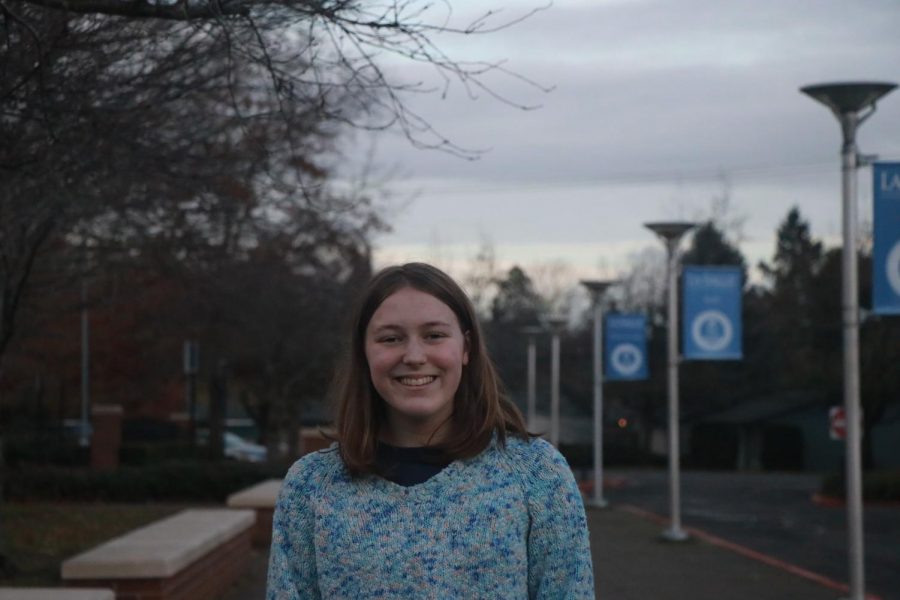
Hannah’s personal journey in self identity has been positive, as she is surrounded by supportive family and friends.
“Because of the people I’m around, I feel very accepted for my identity, but I know that not everyone feels that way,” she said. “I have people in my life who can’t come out to their parents, or else they’ll get kicked out of the house.”
“I’m so fortunate to be in a position where I feel safe around my family and friends, but it’s really tragic to see people I love in such an unwelcoming and painful position, where they have to hide inconsequential facts about who they are so that they aren’t hated by the people they care about,” she said.
Though Hannah’s family and friends have been supportive of her, she said that she has felt the effects of living in a heteronormative society.
“I’ve felt the impact of living in an environment where who I am and who I experience attraction to isn’t normal,” Hannah said. “And it’s difficult because I feel like a lot of kids will grow up in our environment thinking that this gender is this way, and these people are attracted to these people, and if you’re born this way, you have to stay this way and do these things.”
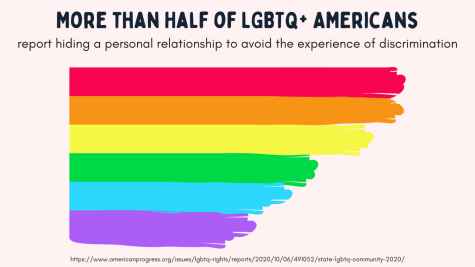
She hopes that with the community and affinity space created by the Equality Alliance Club, she can help her peers understand that everyone is valued no matter their gender identity, gender expression, or sexuality.
“If this club helps one person who can’t come out to their family or one person who is questioning their gender… then that’s really what we’re here for,” Hannah said. “I feel like the Equality Alliance in some way taught me that no matter what labels you use, whether those labels change over time, or if you don’t use any labels, we care about you and we love you.”
Hannah said it seems that LGBTQ+ individuals at La Salle are “sort of drawn to each other.”
“I feel like a lot of people who are straight might not realize how many queer kids that are at our school, because they have different friend groups from them,” she said.
Hannah said the process of coming out is “very unique and very complicated,” and is a “main shared struggle” in which LGBTQ+ individuals can often find commonality, despite each person’s unique experience.
“I feel like with that shared struggle, people in the LGBTQ community need each other, and there’s this sense of relatability,” Hannah said. “But at the same time, they also need people outside of the community to understand them and love them, because those people are the majority of our world.”
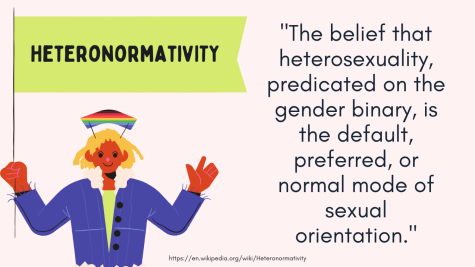
Hannah said that while the La Salle community is “really welcoming for the most part,” there is still room to improve.
One important area is LGBTQ+ representation, Hannah said, which means “sharing the stories of queer individuals in our school.” This can help recognize and celebrate people’s identities, as well as allowing others to grow more comfortable in their own identities.
She said this can be achieved through “our theater department, through sharing the stories through announcements and assemblies, [and] through celebrating Pride Month,” among other avenues.
“Representation goes a very long way,” Hannah said. “Just acknowledging that these people are a large community in our school is an extremely important first step, because if we don’t acknowledge these people, if we erase these people, then we erase the need for change.”
Math teacher and staff moderator of the Equality Alliance Club Mr. Kieron Redford also feels that representation is important.
Mr. Redford said he is “really pleased” the Equality Alliance exists at La Salle, and he helps the club by “being available to be the host and provide the space for the meeting to happen.”
Mr. Redford feels that it’s important for him to be involved to “provide a bit of visibility,” he said. “Showing students that you have a gay teacher at your school… and just trying to make that seem normal, but have it be noticeable as well, [to] make sure they see that kind of representation.”
Mr. Redford said that part of the reason he feels this is important is because when he was younger, he didn’t see LGBTQ+ adults at school.
“There’s obviously such a variety of diversity even within that whole LGBTQ [community], I’m not going to be a reflection of everybody for sure,” Mr. Redford said. “But I just want to… [be] a teacher there who knows something about the experiences that you’re having, and I feel that that’s important.”
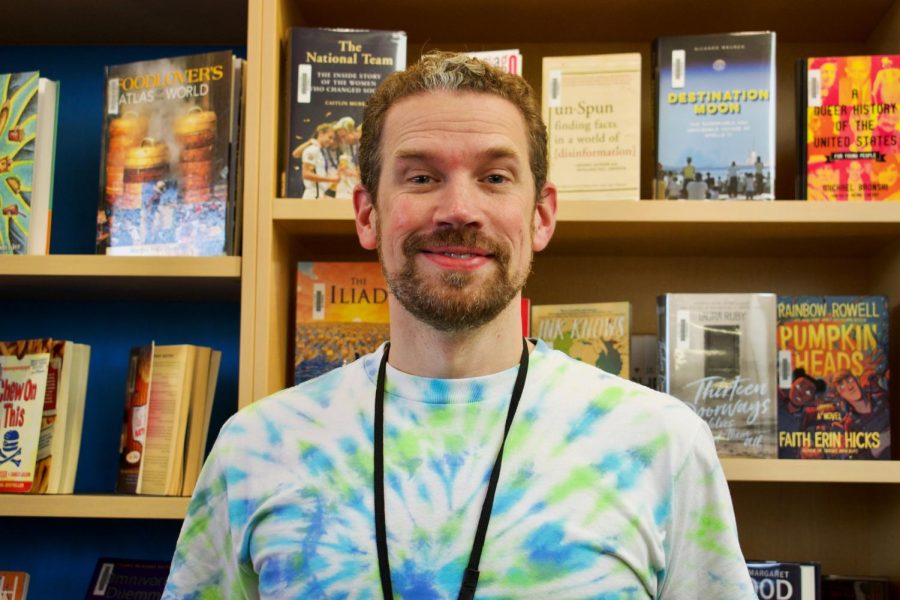
Mr. Redford feels that the best way for him to support students is simply to listen.
“I’m not an expert, and I’m not trained in responding, and I certainly don’t want to necessarily make any suggestions for other people,” he said. “I feel like I can best kind of just show myself, as this is who I am. I can say this is what I went through and did, and that’s me, and listen to them. And so I can be someone that’s safe to talk to.”
Additionally, students have other resources for support at school, with “plenty of really strong allies in the staff and faculty,” Mr. Redford said.
“I love that we are now at a point where we’re kind of seeing there are maybe pockets of people that don’t feel included in that overall feeling of community, and trying to do something about it,” Mr. Redford said. “I think we’re on the journey and we’re making some progress.”
Mr. Redford said that a way to communicate with acceptance and respect is by sharing gender pronouns and being sure to use the correct pronouns for others — an action that, while simple, can go a long way.
As more people add their pronouns to email signatures or Zoom names, aiming to normalize the process to avoid misgendering, it’s important to remember that the movement around pronouns is “not just a fad,” Mr. Redford said. “It’s something that we want to take seriously… That’s who they are, it’s their identity, and you want to honor that, you want to make sure that you’re getting it right.”
Taking this measure to address and refer to another person by their correct pronouns is a step towards a more inclusive community, Mr. Redford said, along with groups like the Equality Alliance.
“I love that we have these groups and clubs that are appearing now, and it’s hopefully… providing more opportunities for people to interact and in some cases just be hanging out with certain people or being able to talk,” he said. “Just being in a space where you feel comfortable and you don’t have to feel defensive all the time.”
Junior Aaron L. is another student moderator of the Equality Alliance, and he described the club as a “safe haven for people in the LGBTQ community.”
“We want to make sure that everybody feels safe and included, and they have a place where they can go if anything goes wrong or if they just want to talk,” he said.
Aaron said that he remembers times where he felt isolated, and as though he “didn’t have anyone to turn to.” By becoming a leader of the Equality Alliance Club, he hopes to prevent others from going through this feeling, and help those who do feel lonely.
“You’re never alone,” Aaron said. “There’s always going to be a community… And no matter how you’re feeling, times do get better.”
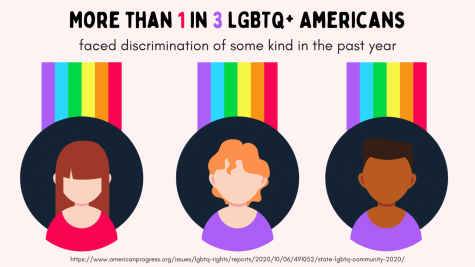
In middle school, Aaron said that it took him a while to fully accept himself and come out to his friends and family, which he said was “challenging.”
“I didn’t really know anything about it at the time, so I was scared of going into this world that I just had no knowledge of,” Aaron said. “I didn’t fully come out until I was in eighth grade, because I was still trying to accept myself… Once I figured it out, I did slowly come out to my friends, and then I came out to my parents. They were very accepting.”
For Aaron, he entered high school having accepted himself and received acceptance from those around him.
But at La Salle, he found that not everyone was respectful of his identity.
The most impactful incidence of homophobia that Aaron has faced took place during his sophomore year.
“I was in class one day, and I heard from behind me the word ‘fag,’” Aaron said.
He didn’t say anything upon hearing this slur, but after it was said, two students near Aaron began harassing him.
“They kept on taking my stuff,” he said. “They had papers, and they kind of threw it at me, like I was trash.”
“They kept on asking me personal questions,” Aaron said. “One question was just so strong that I shut down. And the question they asked was, ‘Have you ever tried to commit suicide because you’re gay?’”
After that, Aaron said he felt like he was “gone.”
“I felt like if I was to even speak, I would just pop off, I would just get so angry, I would lose it,” he said. “So, for the rest of that day, I had to completely shut down. I just told my teacher in the next class, ‘I don’t feel like speaking today, today is not a good day,’ and I didn’t. I did not speak at all.”
Eventually, Aaron did speak up, though at first he hesitated.
“I had felt like I had my confidence and my pride taken away from me,” he said. “I was scared and felt alone.”
After two days without telling anyone what had happened, Aaron talked to Mr. Redford, who he said helped him feel “supported.” After that, the issue was eventually brought to school administration.
“I think where I felt safest the most was when I talked to Mr. Redford,” Aaron said. “I felt like he understood where I was coming from, he understood that I’m hurt.”
Though Aaron was eventually able to heal from the event, it took a toll on his mindset.
“Everyone tells me I’m so strong, but the truth was that I felt so weak,” he said. “I felt as if everything was taken away from me. This is what homophobia can do to a person. It tears them down from the inside, it hurts them mentally and emotionally.”
“I had gone through a rough past, where I was bullied because of who I am, and I was kind of set back into that mindset,” he said.
Aaron was able to move on with the support of his friends, but he still worries about the uncertainty of whether students will exhibit prejudice towards him.
“Some days, I just feel like there’s two targets on my back: one because I’m Black, one because I’m gay,” Aaron said. “I definitely feel like there are days where I just can’t deal with people because it’s just so mentally and emotionally tiring.”
He said he feels that the faculty and staff at La Salle accept and welcome all students, and that his teachers “create a safe space.”
“The staff always make it very clear, you’re accepted, and you’re welcome here,” Aaron said.
Junior Jay G. has also found some of his teachers to be accepting and inclusive.
Jay recalled when, in a Health class, the teacher “started talking about gay and trans people during sex ed.”
“I thought that was really… cool,” Jay said. “I’d been going through the sex ed thing since, like, sixth grade, they started it then. And no one had ever started talking about trans and gay people… I got the opportunity to talk about that kind of stuff.”
Jay also appreciated his French teacher, who showed a French movie about a transgender girl.
“This isn’t even health class where we’re talking about sex ed, this is French class, and they’re showing this kind of stuff,” Jay said. “It made me feel safer in that class, as someone who is trans like the movie, if the teacher is willing to show that kind of stuff.”
Jay said that discussion and representation around LGBTQ+ topics is important, and that while he appreciated the experiences in those two classes specifically, La Salle should continue to expand the conversation.
“The best way you can fight ignorance is making people know about us,” Jay said. “With more discussion about it, more people can find other people like them.’”
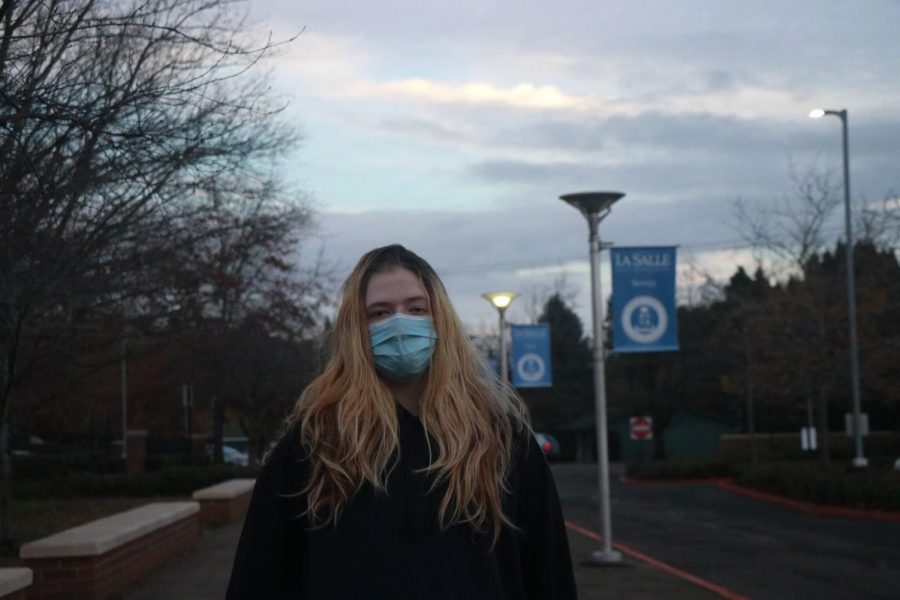
Jay remembers at a young age feeling different about his gender identity and being hurt by assumptions that others would make.
“I always hated it when they would split the class into boys and girls, because I always wanted to go on the boys’ side,” Jay said.
He remembers these instances from elementary school frequently, recalling moments of getting yelled at for sitting at the ‘boys’ table at lunch and being eager to switch to the boys dodgeball team in P.E.
One specific memory that Jay described was at a summer camp, when the boys and girls were split up. He can’t remember the reason, but he said that the boys had to yell “we are the tomcats” and the girls had to yell “we are the pussycats.”
“I specifically remember yelling, ‘I would like to be a tomcat,’ while everyone else was yelling ‘we are the pussycats,” Jay said.
Now, Jay goes by he/him and they/them pronouns. He said that he appreciates when people ask which pronouns he uses when meeting for the first time, a gesture that is in contrast with his past memories of being hurt when others assumed his gender.
“If you ask for my pronouns when we meet, you are immediately on the list of people who I trust,” Jay said. “It just shows that you care about that kind of stuff… I just feel safer around you.”
Junior Charlie C. also appreciates when others refrain from making assumptions, saying that it is “great” that some of his teachers have added their pronouns to their Zoom names.
“It makes a difference to me,” Charlie said. “Because I feel like it shouldn’t be a big deal, it’s just somebody being who they are.”
Charlie said that his friends, who have been “super helpful and uplifting,” also don’t make a “big deal out of” his change in pronouns, which is “the nicest thing about my friends at school.”
“I’m still the same person, I just am more open about my identity now,” Charlie said.
Charlie said that he began questioning his sexuality in sixth grade, and then began questioning his gender around eighth and ninth grade.
“It’s taken a long time to come to terms with it personally, and then also telling other people about it,” he said.
He started coming out to friends during the spring semester of his sophomore year, which he said was “stressful,” but was also made somewhat easier because of the switch to online school.
“I didn’t really feel like I had to be afraid of any sort of backlash in the community, because it’s all online and I haven’t seen anybody really in person for a while,” Charlie said. “I’ve noticed that in pretty much all of my classes, nobody’s said anything about changing pronouns or anything about that, it’s just kind of been a quietly accepted thing.”
Recently in Charlie’s religion class, LGBTQ-related topics were brought up.
Though many perceive the Catholic Church’s stance on the LGBTQ+ community as unaccepting, “it was a really good conversation,” Charlie said, with the main point being that “God loves everyone.”
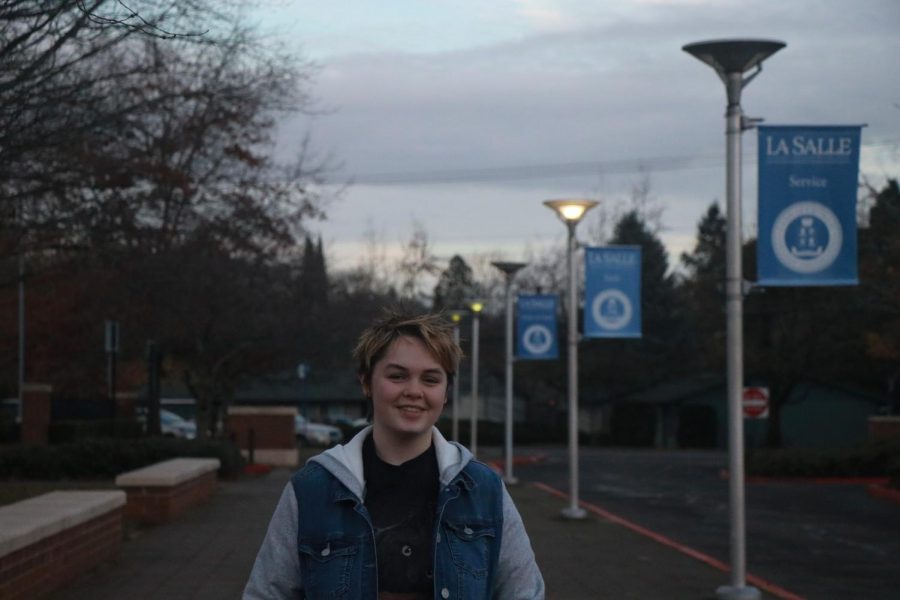
Other students said that so far, there hasn’t been much discussion in their religion classes about the Church’s stance on issues such as same-sex marriage — which the Church does not officially recognize, though Pope Francis recently became the first pontiff to endorse same-sex civil unions.
Aaron feels somewhat relieved that these topics have not been brought up in his religion classes, as “that’s a hard position to be put in,” he said.
“They’re against gay marriage,” Aaron said. “Even having to have a discussion on the fact of why gay marriage shouldn’t even exist, that sometimes can be hurtful, because… everybody should be able to get married to who they want to. They should love who they want to love, no matter what.”
Hannah said that it seems the Church’s stance on the LGBTQ+ community is not often spoken about in class, and she feels that it should be better addressed and discussed.
“I consistently find myself extremely uncomfortable in religion classes,” Hannah said. “I feel like it’s something that’s sort of… taboo, and that’s a problem because we need to be explicit about the issues that the Church has, and decide whether we are going to go with this idea or that.”
For Sid, prayer has been a “comfort,” they said. In middle school, when Sid was bullied for their sexuality, they turned to the Church.
“I always heard my teacher saying, ‘Jesus loves everyone,’” Sid said. “I kind of felt like no one loved me at that time, so I’m like, ‘Oh, well maybe he loves me too.’ And I got my Communion and became Catholic, because I was being bullied by Catholic school students for being gay.”
Though the Catholic Church does not currently recognize same-sex marriage, it does teach messages of love, dignity, and respect for all people.
“Everyone has a different definition for themselves [of] what being Catholic is,” Sid said. “For me, it’s having a relationship with God and loving everyone, being accepting.”
Sid said that they see this value of acceptance with many teachers and students at La Salle.
For example, some teachers address the class with phrases such as “ladies, gentlemen, and everyone else” or “guys, gals, and pals,” Sid said, noting that other symbols in the classroom — like a pin or poster that supports the LGBTQ+ community — are ways that teachers can help students feel seen and supported.
“I don’t know if they realize how important or how big of a deal that is for closeted kids,” Sid said. “You can make a mental note that that teacher is accepting, or this is someone I can come and talk to if I need to.”
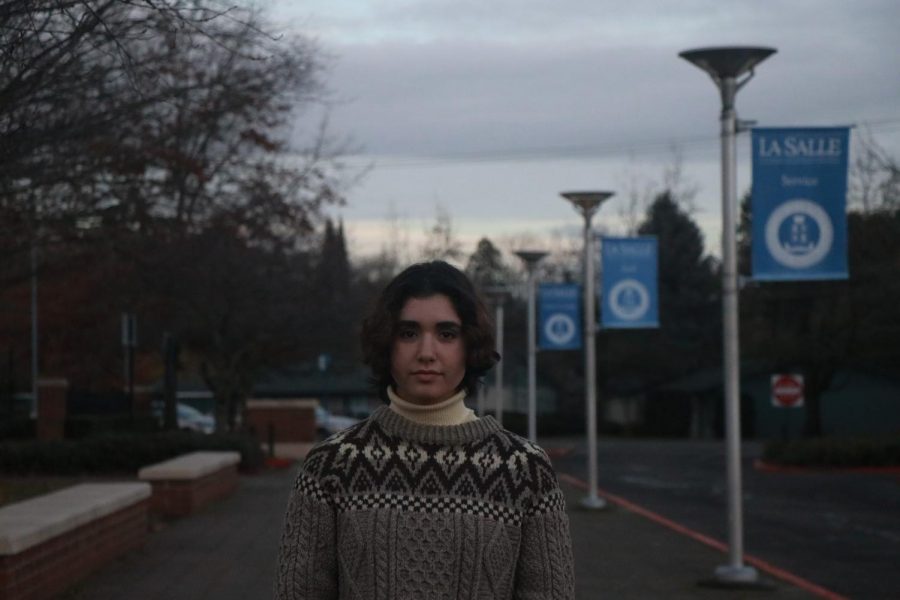
Still, Sid said that there “should be more education” about the LGBTQ+ community in classrooms.
“I think that just educating people on… the LGBTQ community as a whole, what the identities are, would help people realize that it’s not just kind of a group of ‘other,’ we’re everywhere,” Sid said.
Sid said that they are very open about their identity, largely to provide visibility for others.
“I wished someone else had been open about their identity so I had someone to look up to,” Sid said. “So I decided, well, if no one’s going to do that, I should just do it myself.”
Now, Sid has become a confidant for others, with some individuals coming out to Sid privately.
“I have kids I barely know coming to me and telling me who they are,” Sid said. “Knowing that I can be that person for someone, because I wish I had that person, is really rewarding.”
When they first shared that they are nonbinary, Sid only went by they/them pronouns, which they found to be “exhausting” because other people frequently got it wrong and misgendered Sid, sometimes intentionally, which Sid said is “really sad.”
They have since decided to use all pronouns, initially to make it easier for others, and also because Sid feels secure in their own identity.
“I feel like I’ve removed myself from the kind of male and female gender that’s expected, and because I did that, I can really go by anything and still feel comfortable,” they said. “Sometimes people say ‘he,’ sometimes people say ‘they.’ I get a lot of ‘she,’ but either way, I’m okay with it now, because I know how I identify… I did realize that I kind of do like using all pronouns more anyway, because it gives me a lot of freedom to just kind of put myself anywhere.”
Even so, Sid said that going by all pronouns also presents challenges.
“I’ve always had to explain things to people in a way that’s really easy to take,” Sid said. “I feel like if I explain it wrong, I’m going to ruin it for all people who identify how I do, because most people don’t encounter a lot of nonbinary people. So it’s almost like you have to be a little spokesperson in your own community for them, and it’s a lot of pressure to keep it bite-sized for others.”
Sid said that this feeling of needing to keep their identity “bite-sized” for the sake of others’ comprehension is “kind of intense.” It’s similar to what Sid experienced in middle school, when they were often bullied for their sexuality. Though people tried to bring them down, Sid felt that they needed to refrain from getting angry and speaking out.
“I didn’t want to put out a bad image of what LGBTQ people are,” they said. “I felt like that would ruin it for other people in the future… I feel like it’s not fair that I had to act that way, but I don’t regret it.”
Though they went through periods of being bullied and frequently misgendered, Sid feels sure of their identity, and feels that it is important for them to be open about it.
“It was kind of a long road to accepting myself and knowing that even if others didn’t accept how I identify, [that] doesn’t make me any less valid,” Sid said. “Any time I figure something out about myself and I’m really sure about it, I will share it — and I make sure to do it shamelessly, so that people know that if they identify this way, it’s okay.”


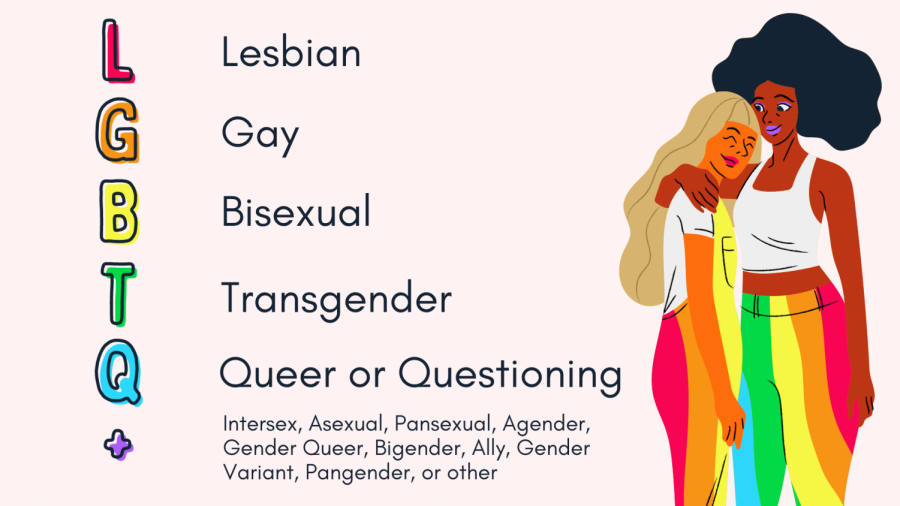
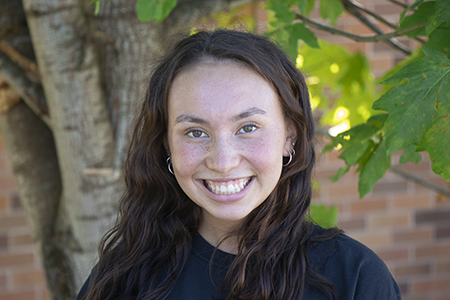



Tom McLaughlin • Jan 14, 2021 at 8:07 pm
Sid, Hannah, Aaron, Jay, Charlie, and Mr. Redford, you inspire me to be courageous enough to be my best self. Thank you for being you. Someday, I pray, it will not require bravery to be authentic. For now, though, it often does, and you’ve demonstrated courage in such a powerful, loving way. You are beautiful, lovable, and good. You just are. And La Salle is richer for your presence.
Chris Krantz • Jan 14, 2021 at 10:51 am
Once again Maddie Khaw has shared with us her tremendous gifts as a journalist. Thank you, Maddie! And to Sid, Hannah, Jay, Charlie, Aaron and Mr. Redford, your courage inspires us. And to all members of our LGBTQ+ community, know that you are loved.
Mr. Krantz
he/him
Candace J. • Dec 18, 2020 at 6:00 am
Beautiful and important words. Thank you!
Maia Gutmann • Dec 17, 2020 at 9:12 pm
Such an important article. Thank you Maddie.
-Maia (she/her)
Hannah R • Dec 17, 2020 at 8:54 pm
Maddie, this article is so important. Thank you for this representation and advocacy— it goes a long way!
Brian Devine • Dec 17, 2020 at 3:56 pm
Thank you Maddie for creating space to tell these stories and to provide representation. Thank you especially to the students in our LGBTQ+ community and to Mr. Redford for allowing us to better understand your experiences and your perspectives. Thanks for helping us learn and grow as allies. La Salle is a brighter, more courageous and more complete community with all of you in it. So glad you are here!
Sid L • Dec 17, 2020 at 11:42 am
Thank you, Maddie, for the representation.
Chloe • Dec 17, 2020 at 11:16 am
This was literally the best falconer article that I’ve ever read. Seeing this representation makes me happier than I can explain. Thank you to everyone who made this article happen!
Kerri Kelvin • Dec 17, 2020 at 9:33 am
Thank you Maddie for writing this important piece. And thank you to all the students who shared their stories. Your voices allow others to feel seen and welcomed in our school community. – Kerri Kelvin (she/her)
Amanda Folsom • Dec 17, 2020 at 8:12 am
Thank you so much for putting this article out here! I’m so grateful to the writer, and to the people willing to be interviewed for this article. It made me feel really happy to read it, and to know that I’m not alone in the community. Thank you all!!!
Ms. Coleman • Dec 17, 2020 at 6:50 am
To our LGBTQI+ Students:
We see you.
We hear you.
We love you. Unconditionally.
Thank you, Maddie for writing such an important article. Also, thank you Falcons for sharing your story and gifts with our Lasallian Community.
Ms. Coleman
she/her